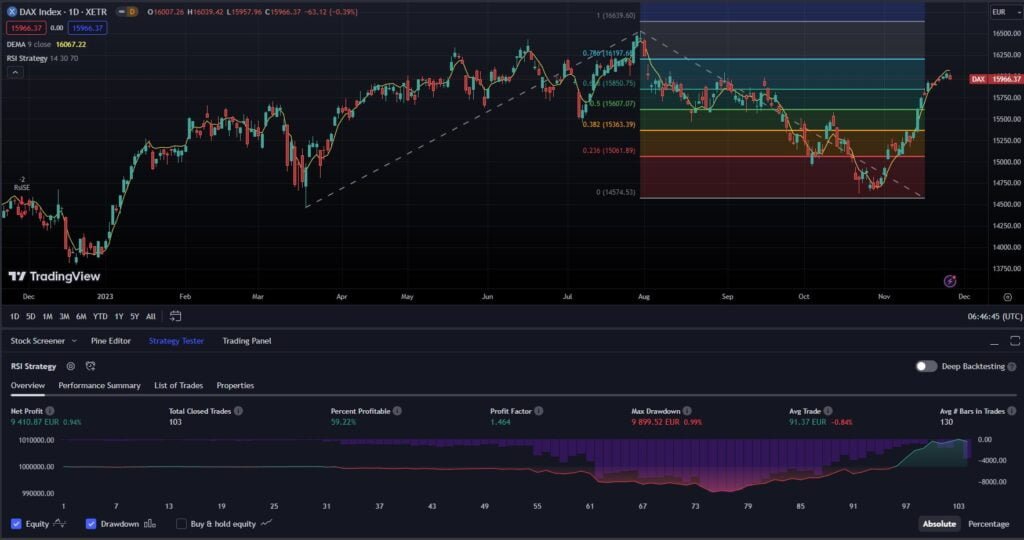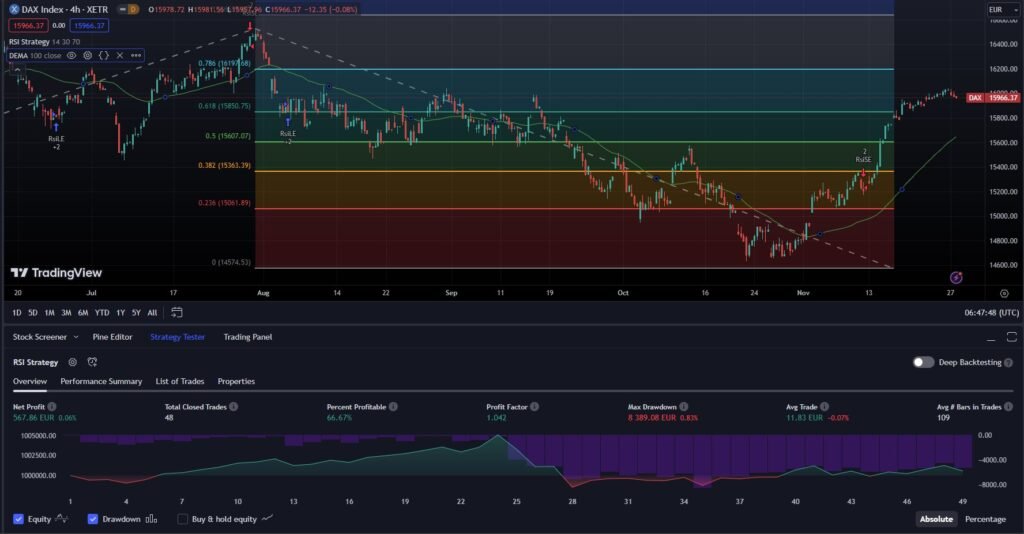Contents
- 1 ECB President Lagarde’s Caution on Prolonged Interest Rates and Economic Challenges
- 2 DAX declined: Ratings Downgrades Impact BASF and Bayer, Weighing on Automotive Stocks
- 3 US Treasury Yields Decline: DAX Fails to Recover in Late Session
- 4 Market Focus: US Consumer Confidence, Federal Reserve Speeches on Tuesday
- 5 German Consumer Confidence Data and ECB Insights on Tuesday
- 6 DAX declined: Support Above EMAs, Eyes on Resistance and Key Levels
- 7 DAX declined: Technical Analysis, EMAs Support, Focus on Resistance and Support Levels
The DAX declined of 0.39% on Monday, closing at 15,966 after a modest 0.22% gain on Friday. Market dynamics on Tuesday poised to be influenced by factors such as consumer confidence figures. That along with addresses from representatives of the European Central Bank (ECB) and the Federal Reserve (Fed). These deliberations have the potential to shape investor sentiment toward riskier assets.
Highlights:
- DAX Decline on Monday: The DAX experienced a 0.39% decline on Monday. Closing at 15,966 after a modest 0.22% gain on Friday.
- ECB President Lagarde’s Caution: ECB President Christine Lagarde emphasized challenges in mitigating inflation and signaled a prolonged period of heightened interest rates.
- Market Downturn and Ratings Downgrades: Monday’s market downturn influenced by ratings downgrades. Impacting BASF and Bayer, with declines of 3.11% and 3.02%, respectively.
- US Treasury Yields Decline: On Monday, 10-year US Treasury yields declined by 1.88% to 4.388%. Impacting the DAX, which failed to recover in the late session.
- Market Focus on Tuesday: Tuesday’s market movements will be influenced by US consumer confidence data, Federal Reserve speeches, and German consumer confidence data, with a potential impact on riskier assets and key support/resistance levels in the DAX.
ECB President Lagarde’s Caution on Prolonged Interest Rates and Economic Challenges
On Monday, ECB President Christine Lagarde reiterated signals indicating a prolonged period of heightened interest rates. She cautioned that the ongoing endeavor to mitigate inflation remains a formidable challenge. Emphasizing the sustained strength in wage growth against an uncertain economic backdrop.
Importantly, no economic indicators from the euro area contributed to the modulation of market risk sentiment during this period. Nevertheless, the orientation of risk appetite influenced by economic indicators from China. Despite industrial profit figures experiencing a positive trend for the third consecutive month, the less-than-impressive growth rate prompted concerns regarding the Chinese economy. This circumstance suggested a need for additional policy measures to reinforce economic stability.
DAX declined: Ratings Downgrades Impact BASF and Bayer, Weighing on Automotive Stocks
Monday’s market downturn influenced by ratings downgrades. BASF experienced a decline of 3.11%, while Bayer saw a 3.02% decrease. The reduction in ratings by Morgan Stanley to “underweight” for BASF and the announcement of Berenberg lowering its price target for Bayer played a role in these declines.
Additionally, investor sentiment, particularly concerning the Chinese economy and the ECB’s indication of a prolonged period of elevated interest rates, weighed on automotive stocks. Daimler Truck Holding registered a decline of 0.84%, and other major players in the sector. Including Volkswagen (-0.82%), Continental AG (-0.68%), BMW (-0.66%), Porsche (-0.65%), and Mercedes Benz Group (-0.34%), all ended the day in negative territory.
US Treasury Yields Decline: DAX Fails to Recover in Late Session
On Monday, the 10-year US Treasury yields experienced a decline of 1.88%, settling at 4.388%. Despite this pullback, it failed to spur a late-session recovery in the DAX. The US equity markets closed in negative territory as investors adopted a cautious stance ahead of impending inflation data and a speech by Federal Reserve Chair Powell.
The Nasdaq Composite Index saw a slight dip of 0.07%. Accompanied by declines of 0.16% for the Dow and 0.20% for the S&P 500.
Also Read: EUR/USD Increased: Focus on US Consumer Strong Confidence
Market Focus: US Consumer Confidence, Federal Reserve Speeches on Tuesday
Later in Tuesday’s session, movements in the market will be influenced by both US consumer confidence data and speeches from Federal Reserve officials. A decrease in consumer confidence could reinforce expectations of a potential Fed rate cut in May. However, a substantial decline in US consumer confidence might revive concerns about an economic downturn and impact more volatile assets.
Economists are predicting a decline in the CB Consumer Confidence Index from 102.6 to 101.0 in November. A reading below 100 could unsettle investors.
In addition, there are other economic indicators, including US house price reports. However, unless there is a significant decrease in US house prices, these figures are likely to take a backseat to the consumer confidence report.
Looking beyond the numbers, attention should also be paid to Federal Reserve speakers. FOMC voting members Michelle Bowman, Austan Goolsbee, and Christopher Waller scheduled to speak during the European session, with a focus on addressing topics such as inflation, the economic outlook, and interest rates.
As the futures markets suggest a mixed start to the Tuesday session, with the DAX down 22 points and the Nasdaq mini up by 1 point, the market awaits further signals from these crucial events and statements.
German Consumer Confidence Data and ECB Insights on Tuesday
On Tuesday, the attention of investors will be drawn to the release of consumer confidence data from Germany. A positive shift in the consumer confidence landscape could provide support to stocks in the consumer sector. Economists are projecting an increase in the GfK Consumer Confidence Index from -28.1 to -27.0.
However, it is imperative for investors to also consider insights from the European Central Bank (ECB). Scheduled speeches by ECB President Christine Lagarde and Executive Board member Elizabeth McCaul anticipated, with a particular focus on their commentary regarding inflation, the economic outlook, and perspectives on interest rates.
DAX declined: Support Above EMAs, Eyes on Resistance and Key Levels
The DAX declined and has sustained its position above both the 50-day and 200-day Exponential Moving Averages (EMAs), with these moving averages providing bullish signals.
A breakthrough above the 16,004 resistance level in the DAX could facilitate a subsequent move toward the 16,142 resistance level.
Key points of focus on Tuesday include consumer confidence metrics and speeches from central banks.

However, should the DAX declined and fall below the 15,850 threshold, attention would then turn to the 15,694 support level.
With a 14-day Relative Strength Index (RSI) reading of 70.02, signaling overbought conditions, there is a likelihood of heightened selling pressure, particularly around the 16,000 level.
DAX declined: Technical Analysis, EMAs Support, Focus on Resistance and Support Levels
The DAX has successfully maintained its position above both the 50-day and 200-day Exponential Moving Averages (EMAs). Confirming bullish price indications.
A breach of the 16,004 resistance level in the DAX would open the door for bullish momentum targeting the 16,142 resistance level.
Conversely, a decline below the 15,850 level would signal a potential descent towards the 15,694 support level.

The 14-4 hour Relative Strength Index (RSI) at 66.94 suggests that the DAX expected to break above the 16,004 resistance level before entering the overbought territory.








